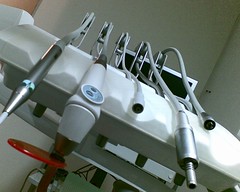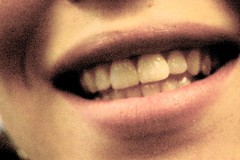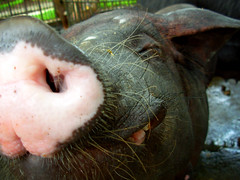
I wasn't planning to write a post about the flu, but the H1N1 'situation' is still around, and I wanted to spread some of the good information I've been looking into. The H1N1 flu (we'll just call it "the flu") has a lot of people talking and a good deal of media coverage (EVERWHERE!).
Now that school has started up again, parents are worried about having their kids exposed to thousands of colds and sniffles, and the hype of the flu is lingering into the fall and winter seasons. UrbanMamas blog has a good discussion going about kids and the flu- check it out if you have little ones in school. It's hard to decide if a vaccine is in your future or not. Regardless, it's best to get as much information about options before you make that decision.
Chinese Medicine: Natural approaches are great and effective options to combat influenza- there are very powerful herbs we use to treat the symptoms. Herbs are being used all over China to treat the symptoms of the flu with great success!
A good list of formulas listed on this site are:
- Gan Mao Ling: This is definitely one of the most widely utilized Chinese patents to treat flu related fatigue, headaches, sore throats, swollen lymph glands, high fever, chills, and back and neck aches.
- Yin Qiao: In a very similar fashion to Gan Mao Ling, Yin Chiao is generally prescribed for the same set of flu symptoms.
- Zhong Gan Ling: This medicine is indicated for more severe conditions such as sudden, high fevers with sore throats and coughing, swollen lymph nodes, aching limbs and headaches.
- Huo Xiang Zheng Qi Wan(Correct the Qi Pills): Primarily prescribed for stomach flus with digestive difficulties of diarrhea, vomiting, abdominal pain, flatulence, nausea and for chills, fever and headaches.
- Yu Ping Feng Wan (Jade Screen Pills): This medicine is prescribed primarily for insufficient immune system in the presence of frequent colds and flu, sore throat, swollen face, sinus congestion and inflammation, and sinus pain headaches.
Depending on your symptoms, the practitioner may make you an individualized formula if you are experiencing a combination of these symptoms.
Vaccines: It's completely your choice if you choose to get the vaccine- every individual has their right to choose. But I am a firm believer in knowing the facts and researching what our options are. Liz Richards, LAc of Blossom Clinic posted a note about pregnancy and the H1N1 vaccine for expectant mothers concerned with mercury in the vaccines. Liz clarifies that the single dose does not contain mercury, but the 10 vial dose does. She also has a link to a video about the vaccine.
Prevention: Treat the swine flu as you would treat the regular ol' flu, which means you must take care of yourself!!
Here is a good list of strategies to prevent spreading sickness from Dr. Lorne Brown of Acubalance:
- wash your hand frequently
- avoid sugary foods
- get adequate sleep
- reduce alcohol
- eat a whole foods, mostly plant based diet
- reduce stress
Nutrition: WellWire.com posted a delicious recipe for an immune-boosting soup- I'm definitely making this tonight! Remember to drink plenty of clean water, and eat lots of garlic and ginger!
Anti H1N1 Soup for 2
1 handful dry shiitake mushrooms, 1 tablespoon olive oil, 4 cloves garlic thinly sliced, 1 onion thinly sliced, 1 small piece ginger thinly sliced, 3 cups pork stock (lol kidding, this is hard to find – any stock will do), 4 glugs of sake, 2 spring onions.
Soak the mushrooms in boiling water until tender. Remove the soaking liquid. Saute the mushrooms, onions and garlic in a tablespoon of oil until tender but not browned. Add the stock and the ginger and simmer on low heat for about ten minutes. Season to taste and just before serving add the sake and spring onions.
Whatever route you choose is up to you. Just make sure you have all of the correct information before you take action.
Stay healthy!
(Photo by kozumel)
 The global spread of Chinese Medicine is taking place before our eyes! Acupuncture is becoming more accepted into the mainstream every day - it's a great time to be an acupuncturist, and I can't wait to see where we are in 10 years.
The global spread of Chinese Medicine is taking place before our eyes! Acupuncture is becoming more accepted into the mainstream every day - it's a great time to be an acupuncturist, and I can't wait to see where we are in 10 years.


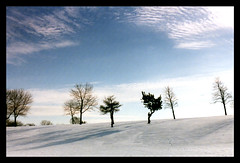



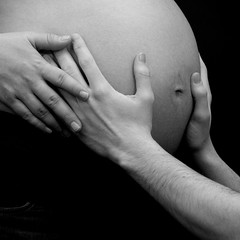









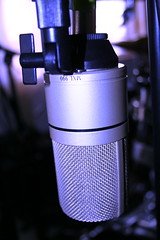

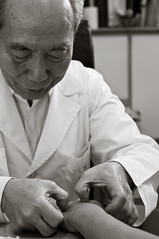 Happy Oriental Medicine Day on Saturday!
Happy Oriental Medicine Day on Saturday!

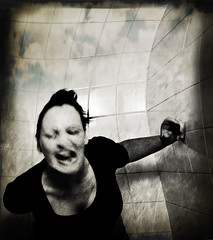






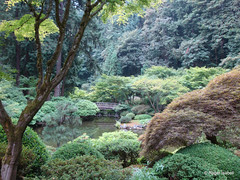





 Menopause is a time of transition and change in a woman's body. For some, it is a peaceful passage, with few symptoms or
worries. For others, it may be an entirely different journey. Many women experience symptoms that are dif?cult to deal with during menopause, which may last a few months to several years. Symptoms vary from mild to severe, and are brought on as the body adapts to a decrease in the amount of estrogen.
Menopause is a time of transition and change in a woman's body. For some, it is a peaceful passage, with few symptoms or
worries. For others, it may be an entirely different journey. Many women experience symptoms that are dif?cult to deal with during menopause, which may last a few months to several years. Symptoms vary from mild to severe, and are brought on as the body adapts to a decrease in the amount of estrogen.
 Do women REALLY have to deal with irritability, breast tenderness, bloating, and painful cramping every month when their menstrual cycle comes?
Do women REALLY have to deal with irritability, breast tenderness, bloating, and painful cramping every month when their menstrual cycle comes?
